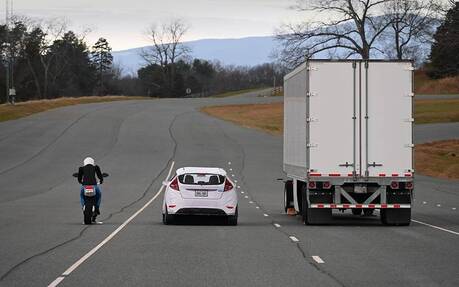Auto Braking Systems Less Effective With Motorcycles, Large Trucks, IIHS Finds
Front crash prevention systems with automatic emergency braking (AEB) aren’t as effective when the vehicle ahead is a motorcycle or a large truck, the U.S. Insurance Institute for Highway Safety (IIHS) has found.
Using its own test programs and also looking at police-reported rear-end crash rates for passenger vehicles with and without AEB from 2017 to 2021, the IIHS claims these systems reduce rear-end crash rates with medium or heavy trucks by 38 percent and motorcycles by 41 percent, compared with a 53 percent reduction in rear-end crash rates with other passenger vehicles.
- Also: Few Autobrake Systems Perform Well at Night, Study Confirms
- Also: Watch: Here’s How Transport Canada Tests Collision Prevention Systems
If they were just as good, an estimated 6,000 crashes a year could be prevented in the U.S.
The IIHS, which first began evaluating front crash prevention systems 10 years ago, previously found that the technology is far less effective in the dark than during the day.

More recently, a team from the IIHS partnered with researchers from Transport Canada to gauge how various front crash prevention systems react to different vehicles and surrogate targets. In total, the two organizations examined how five 2021-22 models from Acura, Subaru, Toyota, Volkswagen and Volvo reacted to 12 different non-passenger vehicles or surrogate targets and seven different passenger vehicles or surrogate targets, at three different speeds no less.
“Motorcycles are smaller and narrower than cars, making them more difficult for camera- and radar-based systems to identify, especially at higher speeds,” IIHS Senior Research Scientist David Kidd said. “Extra-large vehicles are presumably easier to detect, but their dimensions appear to confuse the systems’ algorithms.”
To make sure the systems are equally adept at preventing crashes with large trucks and motorcycles and to address the large portion of rear-end crashes that happen at higher speeds, the IIHS is conducting a new vehicle-to-vehicle front crash prevention evaluation, with plans to publish the first updated ratings early next year.
